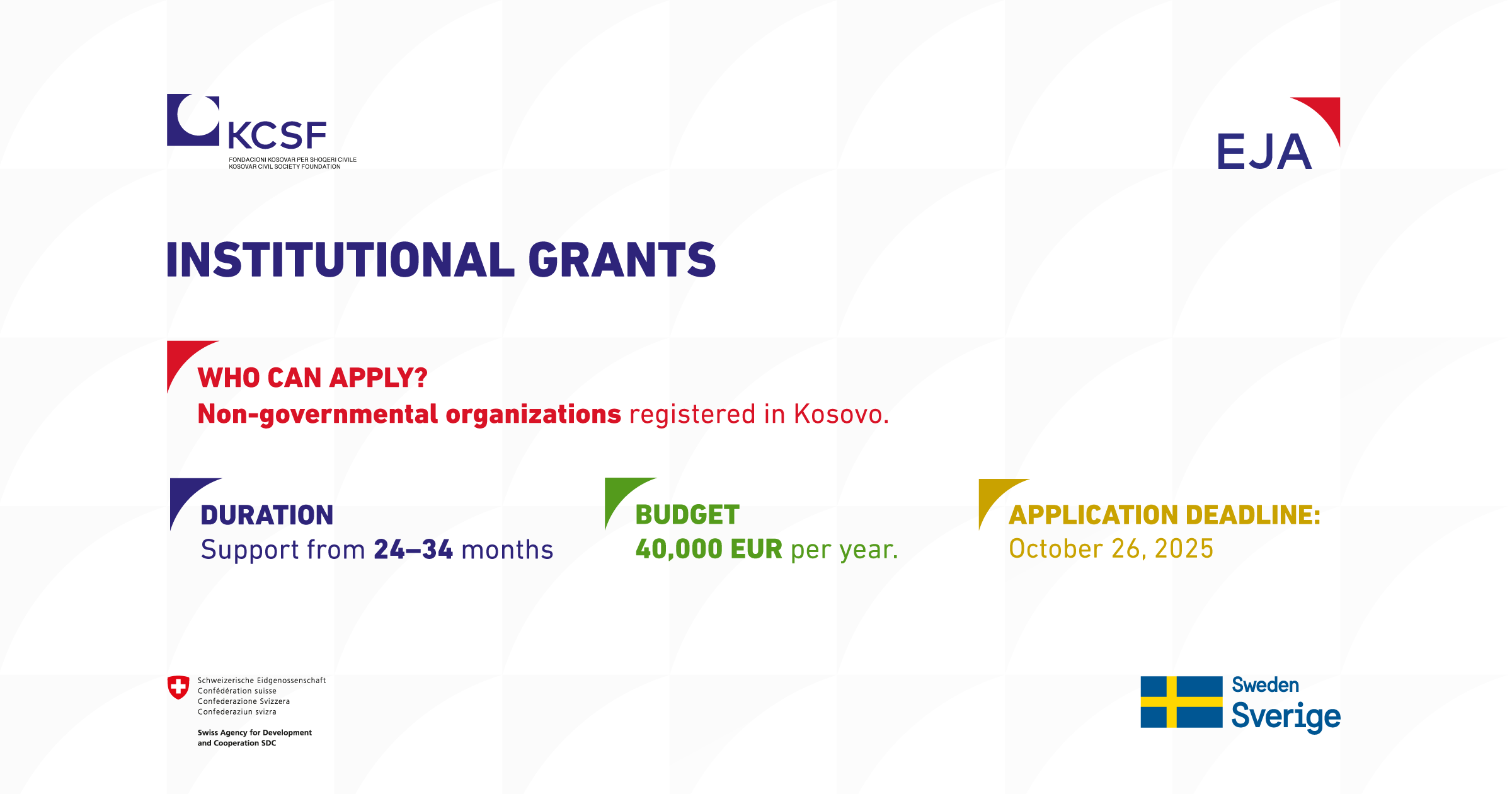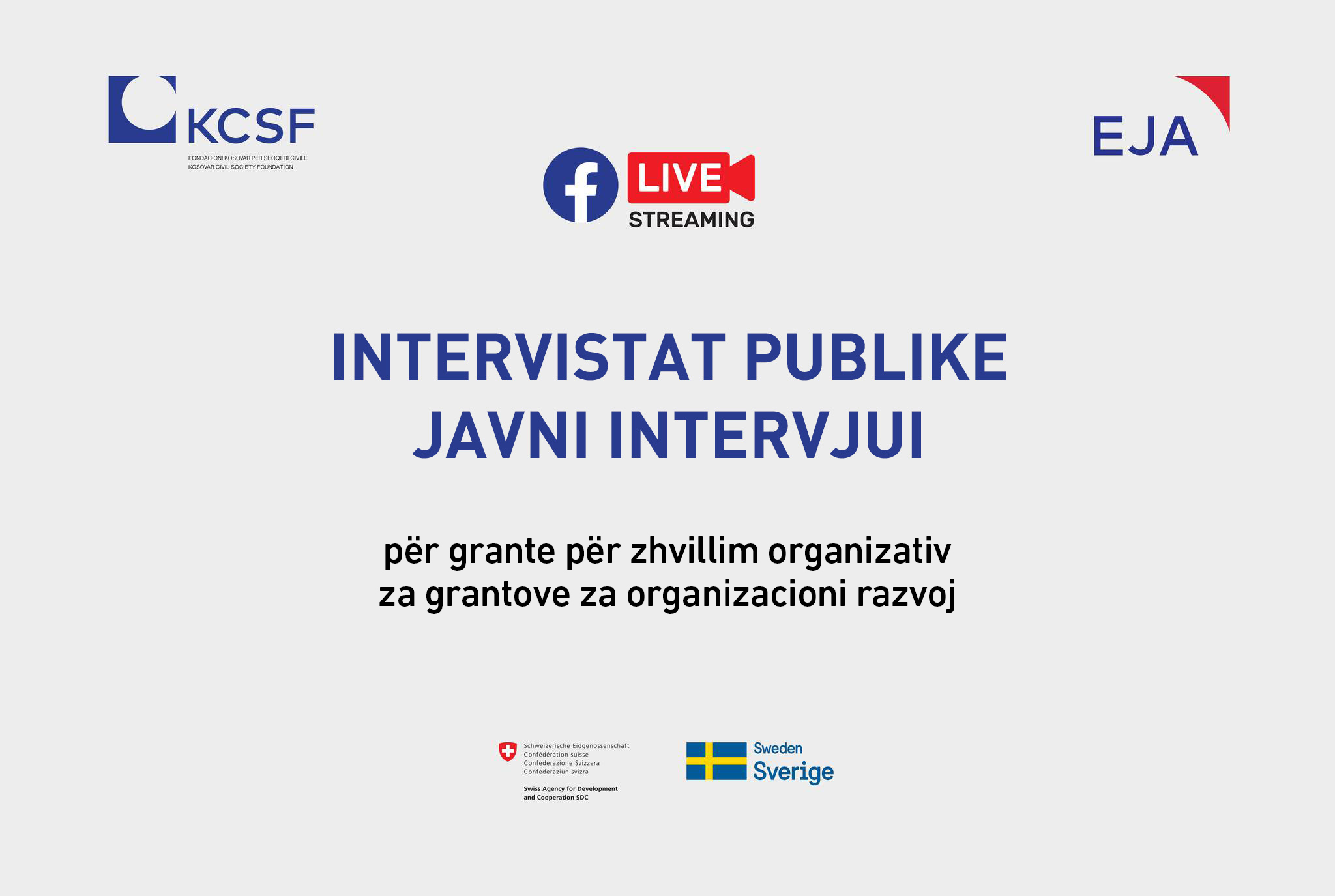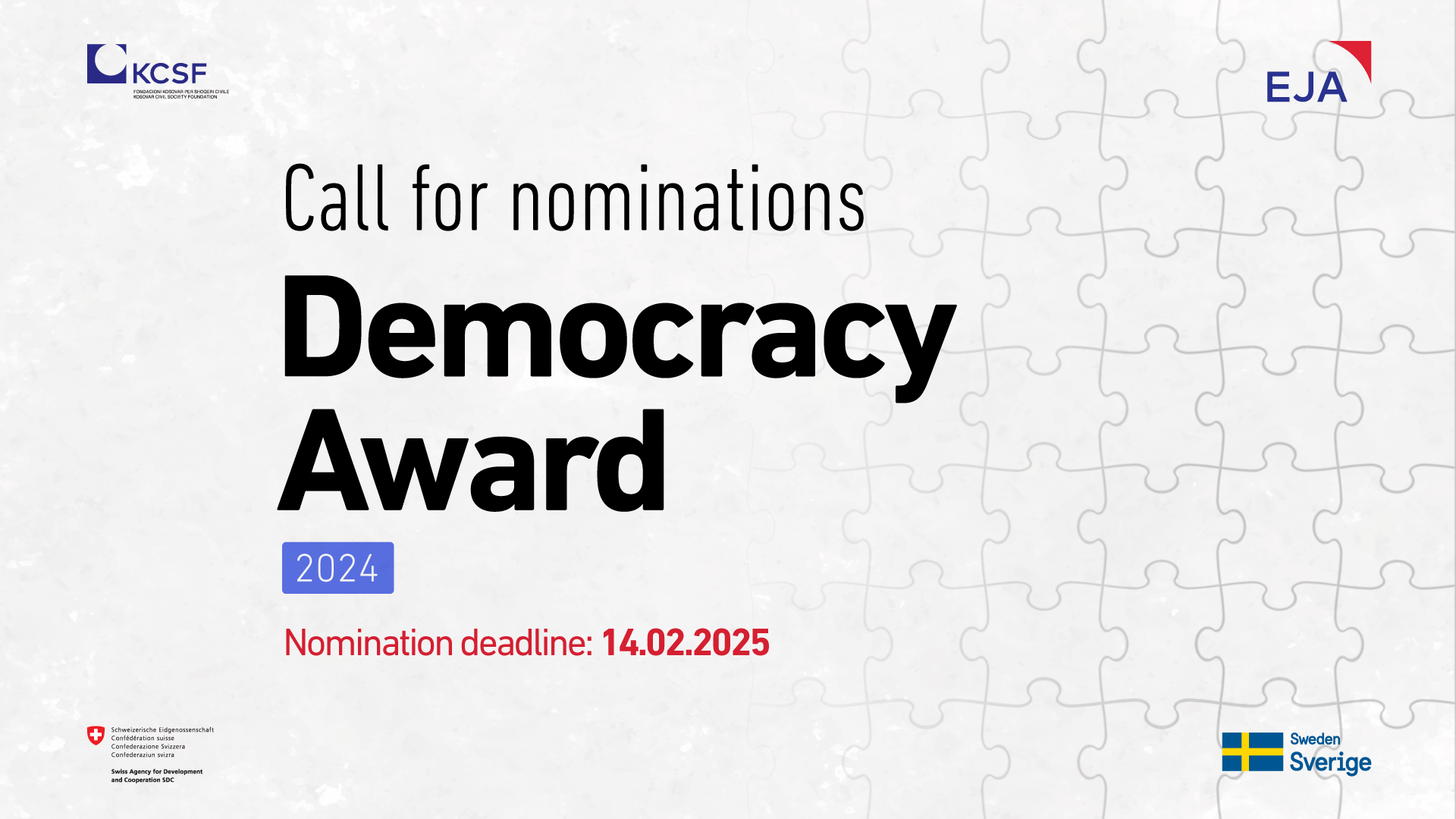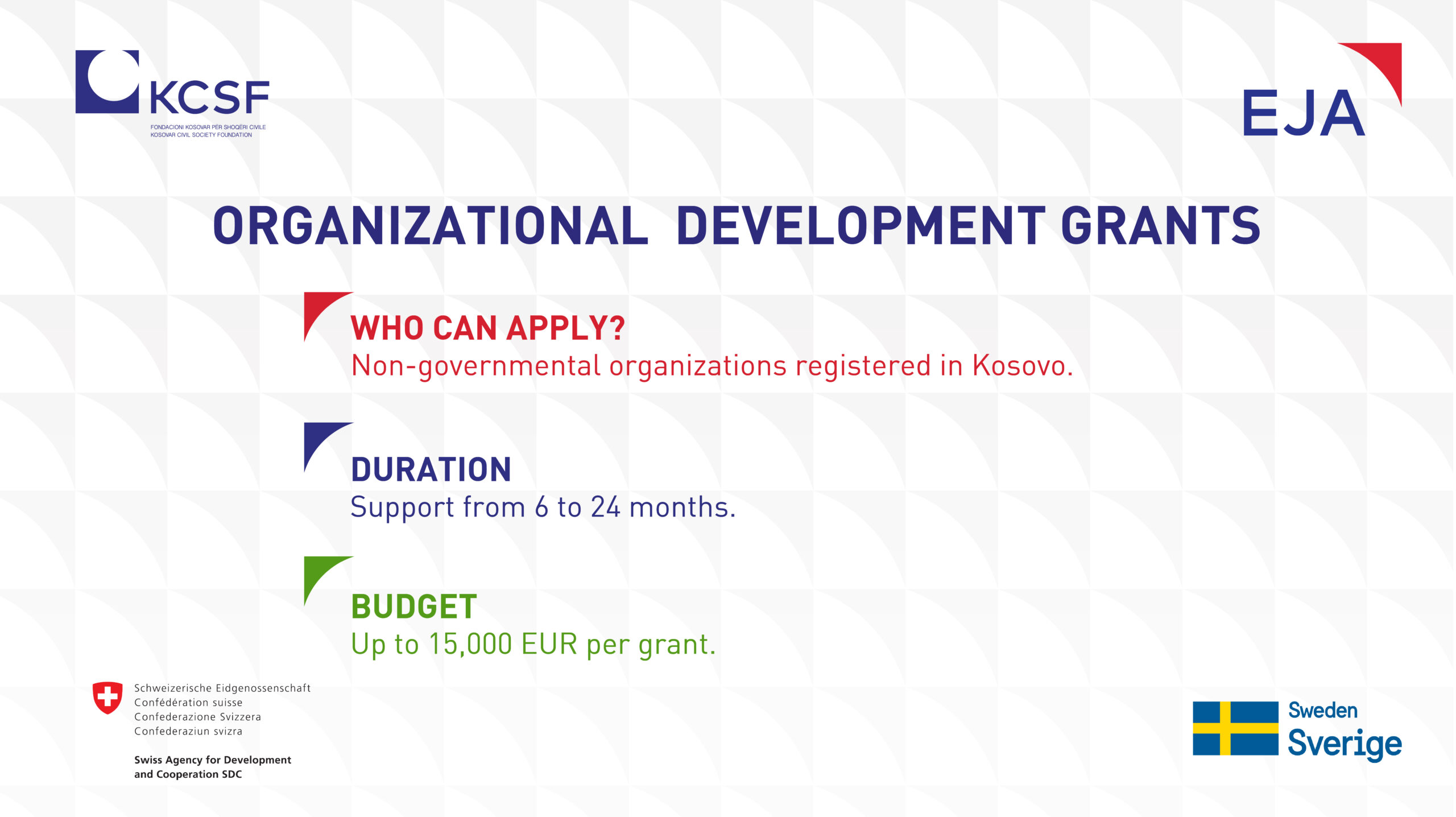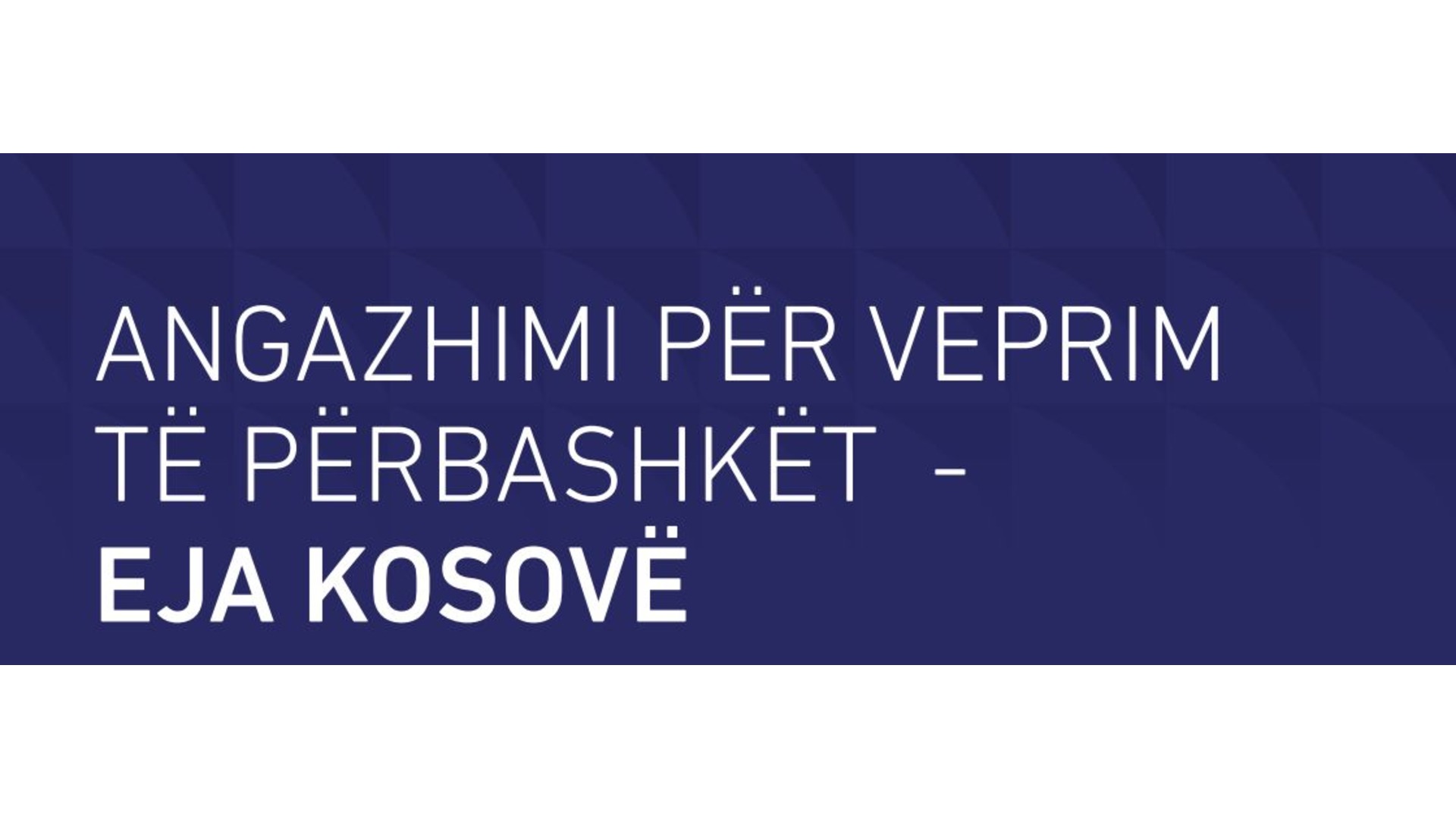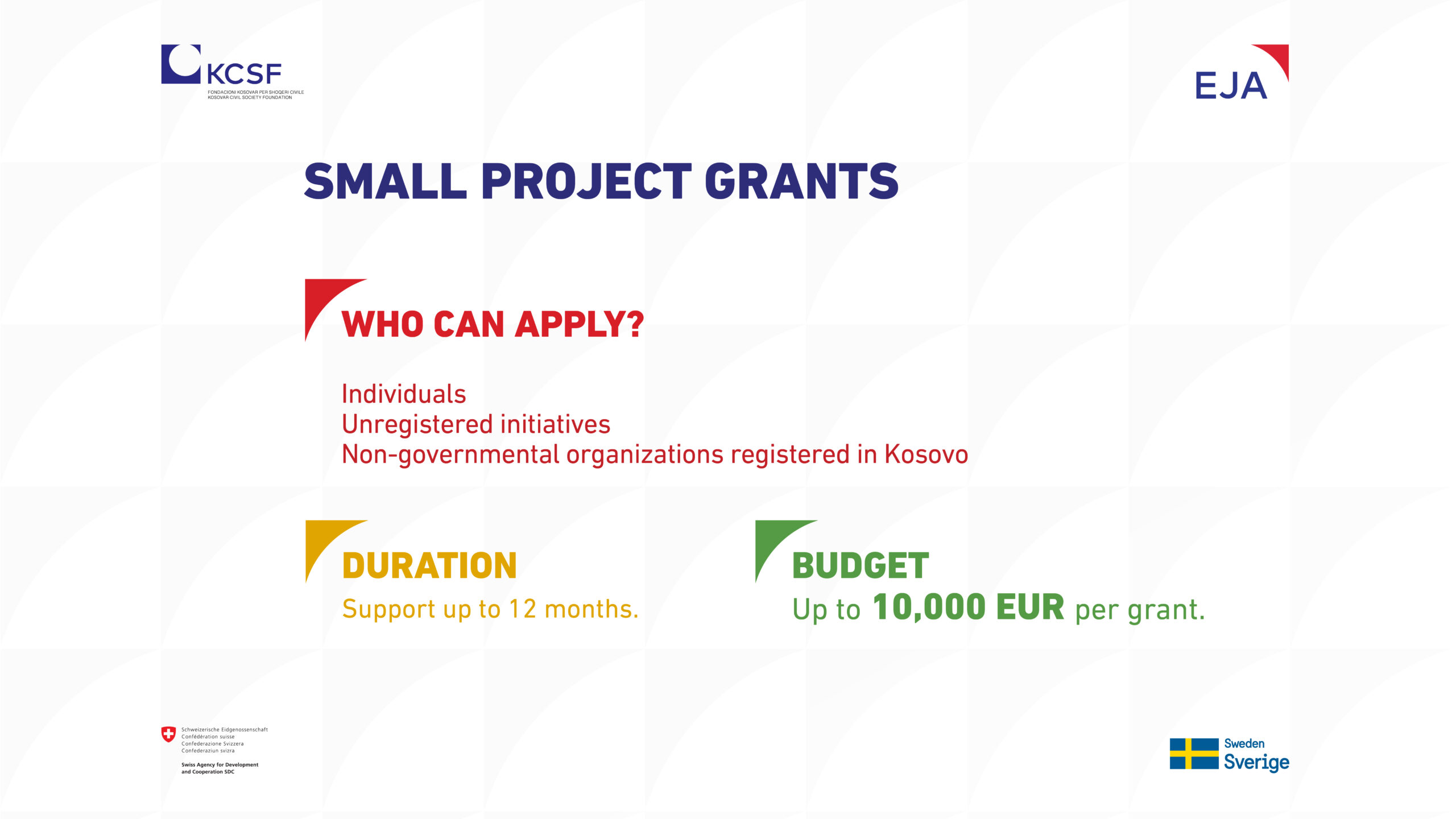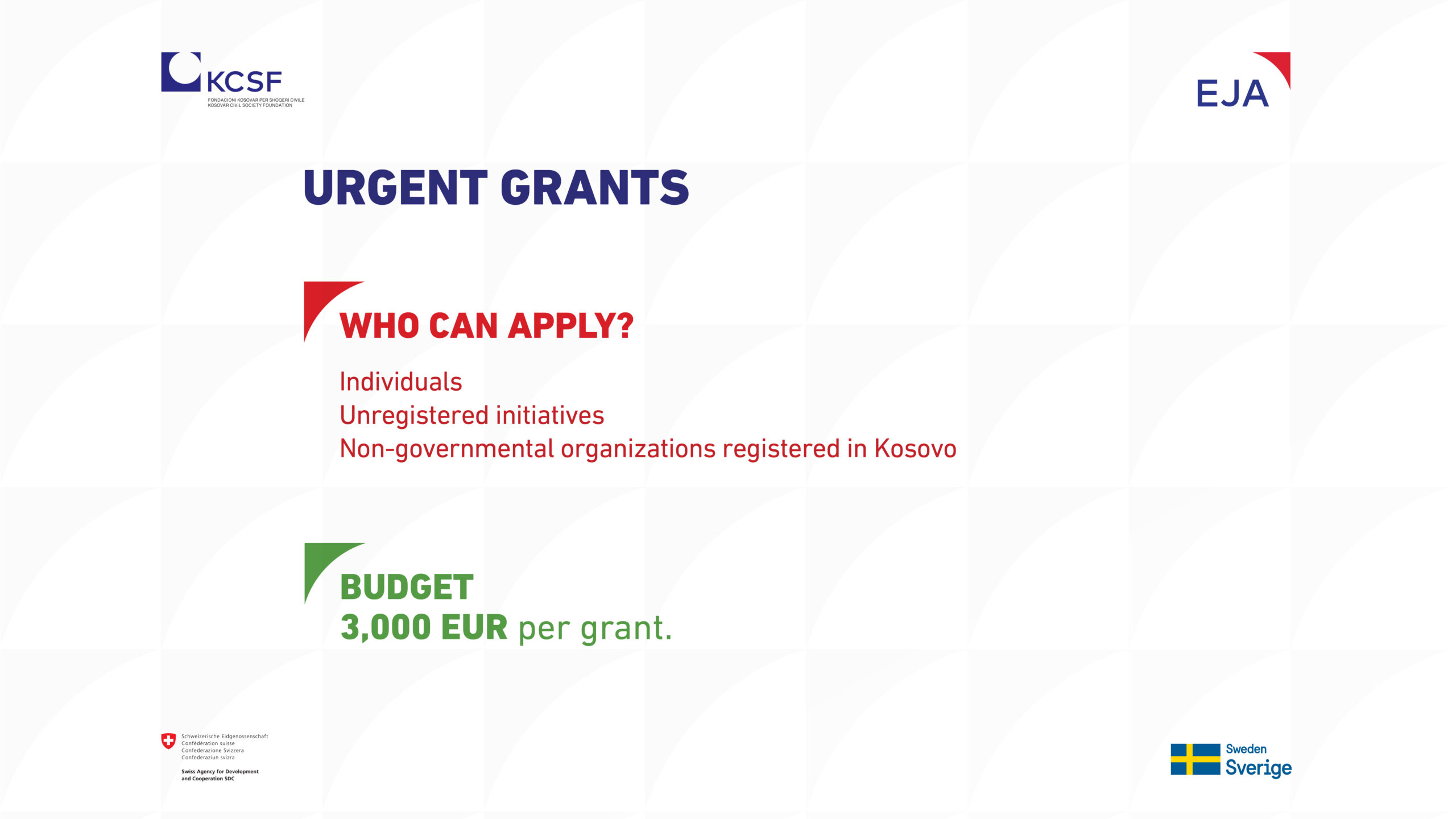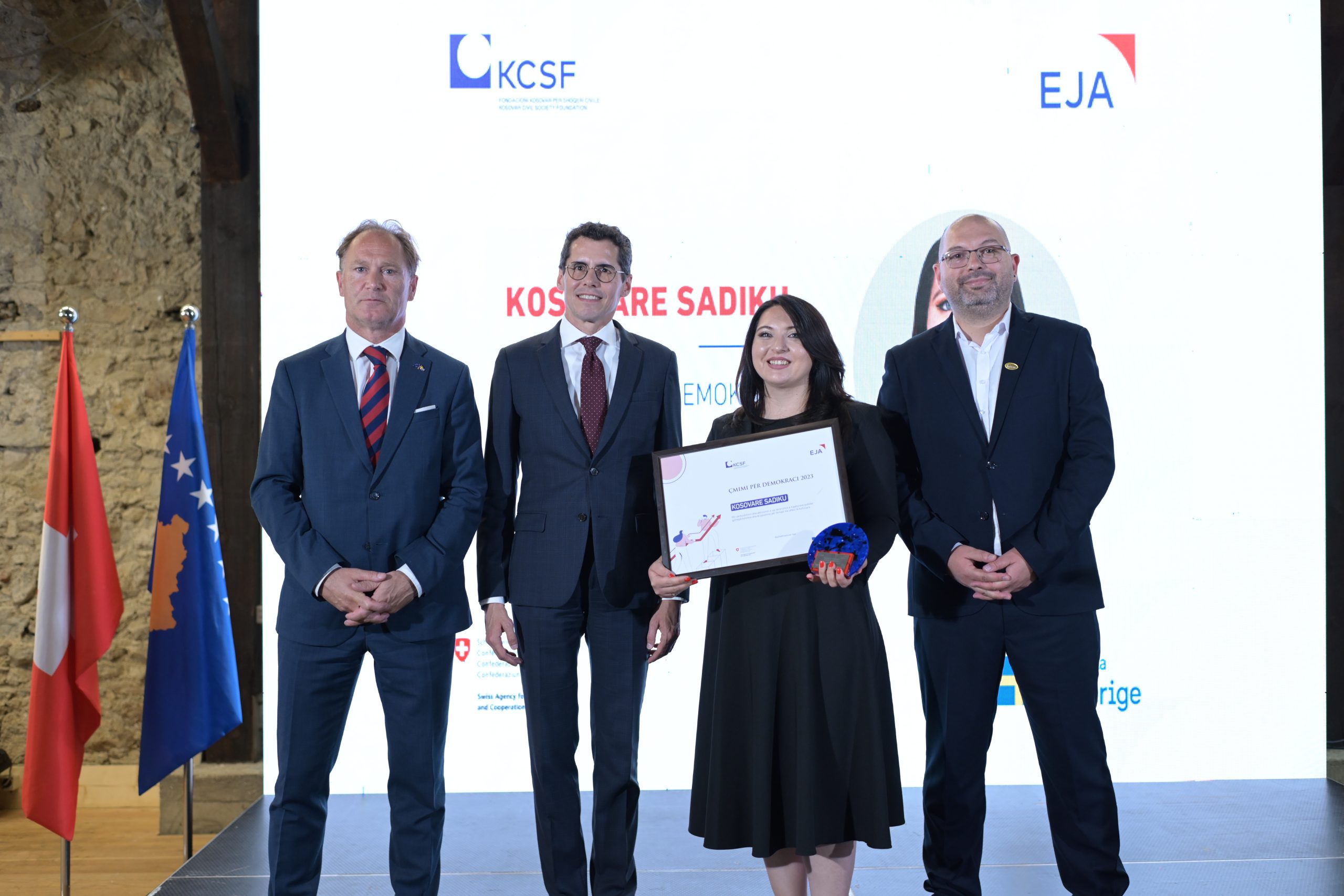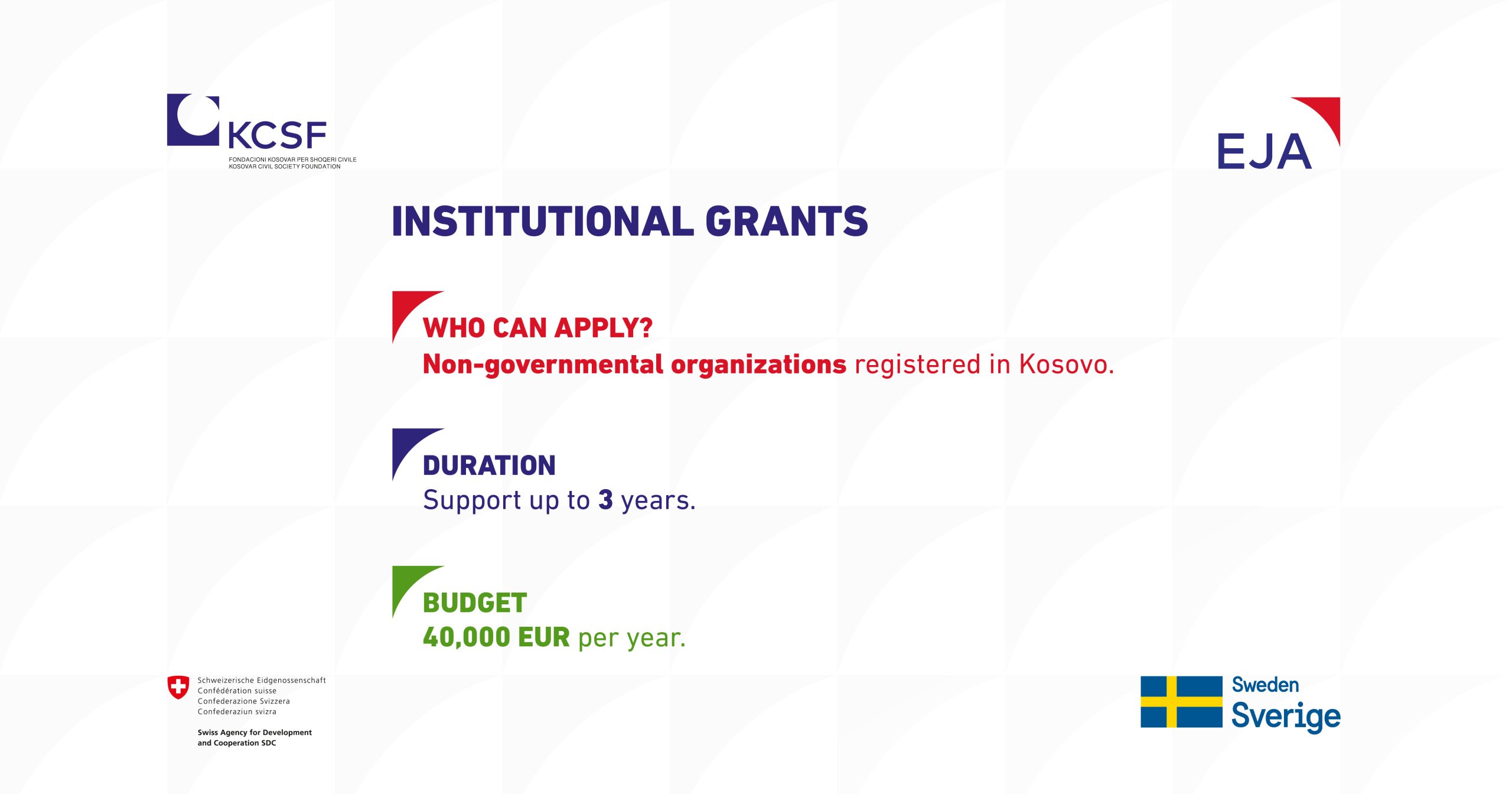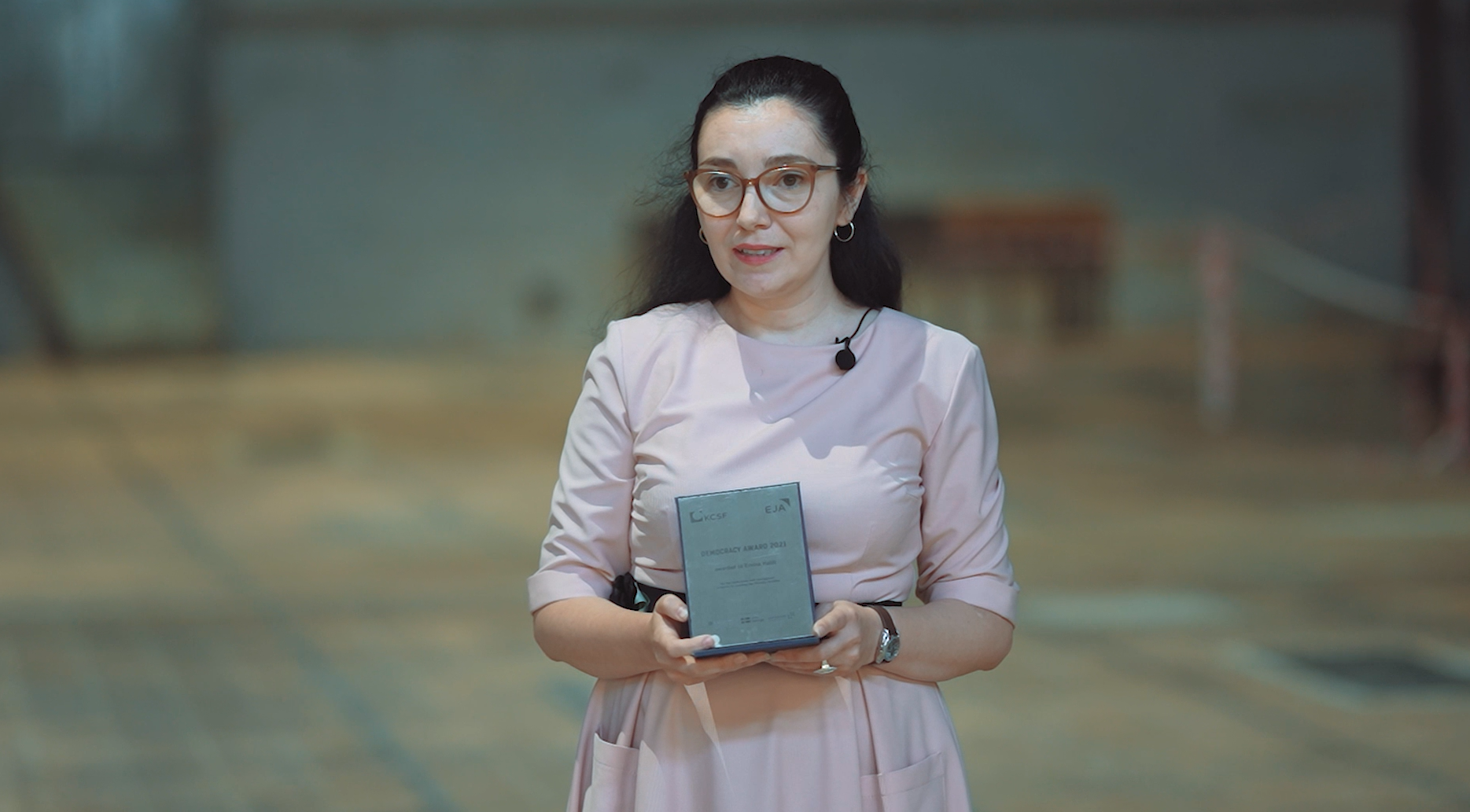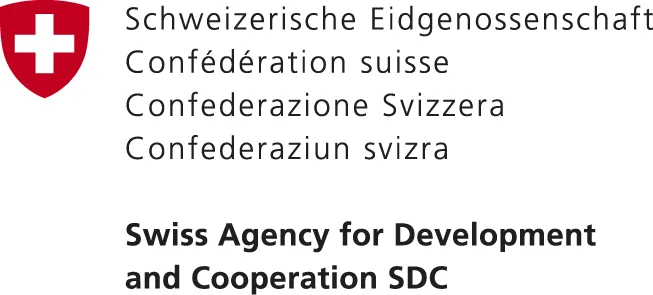1. The platform does not accept the application date, why is this happening?
The implementation of grants is planned to begin in March 2026, so it is not possible to apply with an earlier date.
2. The platform does not accept the amount of funds for the application, why is this happening?
For the amount, the format must contain only numbers, without dots or commas in between.
3. We downloaded the document package for the open call for Institutional Grants (EJA Kosovo), but we couldn’t find the budget form.
The budget form can be downloaded directly from the platform during the application process.
4. Our organization was established this January and we do not have financial statements for 2023 and 2024. Will this penalize us?
The lack of financial statements for newly established organizations is not a reason for penalization. As stated in the guidelines, these are required only if applicable.
5. If two CSOs apply in partnership but their executive directors are family-related, is this a conflict of interest?
Partnership applications are not allowed under the institutional grant. Moreover, applications involving individuals with family ties are not in line with good governance principles promoted by KCSF.
6. The online system does not allow a duration of 36 months.
Organizations may apply for support lasting between 24 and 34 months.
7. In the Logical Framework template, should we include only part of the strategy or the entire organizational strategy?
The Logical Framework should reflect the organization’s entire strategy, even if the KCSF support covers only a part of it.
8. What is meant by “service-type activities”?
These are advisory, consulting, or assistance activities for institutions or third parties, where the organization provides technical or professional services without significant citizen engagement.
9. What is meant by “proper follow-up” after awareness campaigns?
It refers to actions that produce measurable change in the community and involve direct engagement beyond mere information-sharing.
10. Should the budget be detailed for each activity or can it be general?
The budget must be detailed for each activity and aligned with the organization’s strategic goals.
11. What is meant by an “active contract”?
An active contract refers to a grant agreement between KCSF and a grantee that is currently in force, including all EJA program grants.
12. What is meant by “amateur cultural associations”?
These are organizations formed by non-professional cultural practitioners who promote or perform various forms of art, including multidisciplinary initiatives.
13. Is there an exact number of staff that an organization should have?
No. There is no fixed number. The organization should have the minimum capacity to effectively implement the proposal.
14. If we apply now for this grant, will it prevent us from applying to Sida or SDC in the future?
Donors have the right of veto for any applicant on the recommended list if it is considered that:
(a) they are in conflict with the values promoted by the donor;
(b) their activities overlap with other similar interventions funded by the respective donor;
(c) the organization is supported with an institutional/core grant from Sida during the period it is seeking support from EJA Kosovo.
The right of veto is exercised within this evaluation process. Applying to EJA does not prevent you from applying to future calls from Sida or SDC. However, any decision regarding the use of the veto remains at the discretion of the donors.
15. Our strategy covers two years, not three — can we apply?
Yes, because it covers most of the implementation period.
16. Can we include developing the future strategy under capacity building?
Yes, you can.
17. If implementation lasts 30 months, can we use the full €114,000 budget?
The total amount of €114,000 applies to a maximum duration of 34 months. For a shorter implementation period, the amount should be adjusted proportionally. For example: for 12 months, up to €40,000; for 10 months, up to €34,000. The reference amount of €40,000 per year should be divided according to the number of implementation months.
18. Can we organize a competition where the winner receives a symbolic financial amount managed by the organization?
Yes, as long as funds are not directly transferred to third parties and remain managed by your organization.
19. Can the program have co-financing from another donor?
Yes. This is foreseen in the budget form. One column indicates the percentage requested from EJA, and another column indicates if there is support from another donor. However, applying in partnership between two organizations is not allowed.
20. Can a newly established organization (2024) apply?
Yes, you can apply.
21. During the application, can we save a draft?
It is possible to save it as a draft. As long as you haven’t submitted it, you can return and make changes. If it helps, you can download the form in Word format, work on it in that document, and only click ‘Apply’ when you are ready, after which no further changes can be made.
22. In the areas of intervention and target population, you mention increasing citizens’ participation, strengthening the role of civil society in advocacy, empowering youth to shape policies, and civic education on human rights. On the other hand, awareness campaigns are not allowed. Since almost all intervention areas may include awareness-raising elements (sometimes unavoidable), can you provide examples of activities that have contributed to these fields, other than awareness campaigns (e.g., training, workshops, other approaches)?
An additional clarification: when we say that awareness campaigns are not allowed, we mean they are not allowed as stand-alone activities. If there are adequate follow-up actions that give meaning to that campaign, and it is not limited only to informing citizens, but includes real and meaningful interaction with citizens, communities, or target groups you work with, then with these complementary elements, it is allowed.
23. Is there a character limit for answers on the platform and Word file?
Yes, the character limit is indicated in both the platform and the Word version.
24. Is there a preferred percentage of the budget that can go to internal human resources and external contractors? Are there any restrictions, or do we decide this?
This decision is up to you. Apart from the 15% foreseen for organizational development, there are no other restrictions. The cost-effectiveness of the budget is assessed by the Grant Evaluation Team — meaning how realistic, applicable, and supportive it is for the organization — but there is no fixed percentage allocation for salaries or other aspects
25. Could you provide a more detailed explanation of preparatory studies — in what sense are they not supported? If the applying organization uses them not for the purpose of the grant but only as an analysis for the target groups, is this supported in that case?
They are not supported when most of the work is focused on producing a study in a specific field. If the organization has other activities, citizen engagement, public policy analysis, and the entire grant is not focused solely on the study, they are allowed. As the guideline states, when projects consist entirely of preparatory or feasibility studies (e.g., analyzing a problem and the entire activity revolves around the study), they are not fundable. However, aspects of developing policies or documents of public interest are allowed, provided not all activities are focused on the study.
26. Is collaboration with other organizations allowed during the implementation of activities? For example, if the topic is integration, democratization, and involvement of communities, can community NGOs collaborate?
Partnership for grant implementation between two organizations — including joint budgeting and strict division of activities — is not allowed. Other NGOs may be involved in activities, but not to implement your activities; they cannot be the lead implementer. You may have thematic collaboration, but you remain the activity holder, organizer, budget manager, and responsible entity. Two organizations cannot create an activity where responsibilities and budget are shared.
27. The 10% for experience — does it refer to your grants or thematic work?
It refers to the organization’s experience in the thematic areas of the application, not only prior KCSF grants.
28.We have a question regarding the content of Chapter 4 of the application and the Logical Framework. In Chapter 4, applicants are asked to elaborate on the organization’s strategy, strategic goals, and the section on Main Expected Outcomes. Could you clarify whether the “Main Expected Outcomes” should include the key results arising from the program for which we are applying for an institutional grant, or those related more broadly to the organization’s strategy? This question is directly related to the Logical Framework, as it requires listing main expected outcomes and results, which according to the guidelines seem to refer more to the proposed program rather than the overall strategy. In other words, even though Chapter 4 is dedicated to the organization’s strategy, should the expected outcomes focus primarily on the anticipated results of the program supported by the institutional grant?
Chapter 4 of the application, as emphasized in the guidelines, aims to present the organization’s overall strategy, strategic goals, and how they contribute to the organization’s medium- and long-term objectives.
The “Main Expected Outcomes” section within this chapter, as well as in the Logical Framework, should reflect the key results expected to be achieved through the support requested from the institutional grant—i.e., the outcomes that will be made possible as part of implementing the strategy during the grant period.
In other words:
- The strategy should be presented in its entirety to show the organization’s overall direction;
- Meanwhile, the expected outcomes (main expected outcomes) in Chapter 4 and in the Logical Framework should focus on the segment of the strategy that will be implemented with the support of EJA Kosovo.
This distinction helps clearly assess the impact that the institutional grant will have on achieving the organization’s strategic objectives.

